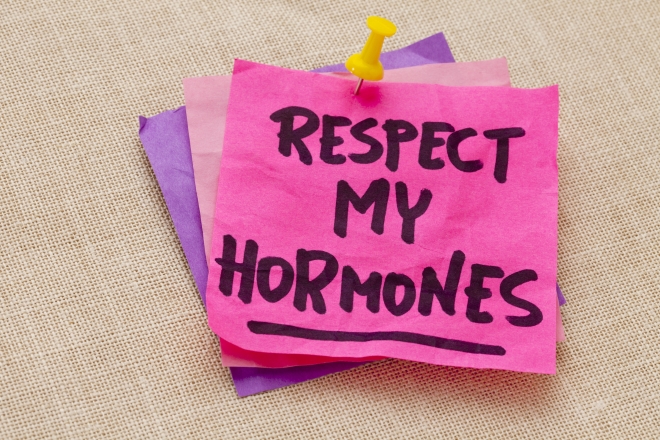Hormones are small messengers that travel through the bloodstream to different tissues and organs of the body. They are “controllers” that help regulate the behavior and physiology of all organs.
Different glands in the human body produce many different kinds of hormones. The collective system is called the endocrine system.
The endocrine system cumulatively produces hormones responsible for regulating the growth and healthy functioning of everything from metabolism to sleep, moods, reproduction and every other aspect of the body.
The glandular production of hormones is a complex process which involves basic good fats and cholesterol. When there’s an imbalance in these basic dietary elements, the hormones produced are also affected adversely.
Similarly, the hormones produced can also be negatively affected due to the presence of toxins in the body.
Symptoms of Hormonal Imbalances
The symptoms of hormonal imbalances in the body are very difficult to observe and can easily be overlooked.
Common and Serious Health Issues and their Cures
A very small imbalance in the production of hormones may lead to major unwanted changes in the body.
Diabetes is known to be the most common type of disease which develops due to hormonal imbalance.
Diabetes
When someone has diabetes, the body is unable to process a simple type of sugar called glucose. This is due to either the insufficient production of a hormone called insulin or an organ malfunctioning. Diabetes can cause weight gain, vision loss, fatigue and various skin diseases.
Diabetes can be cured or controlled naturally in a number of ways. Acupuncture, biofeedback and guided imagery are some of the methods used for curing diabetes.
Adding natural dietary supplements to the diet also helps in fighting diabetes. Chromium, magnesium, ginseng, vanadium and Coenzyme Q10 are known to be very helpful in fighting the disease.
Plant foods like Okra, broccoli, sage, brewer’s yeast and cinnamon are also good for people diagnosed with diabetes.
Thyroid problems
Another health issue caused by hormonal imbalance is malfunctioning of the thyroid gland. Thyroid glands produce thyroid hormones which help in carrying out major bodily functions.
If insufficient thyroid hormones are produced, it may result in hypothyroidism. This may cause weight gain, fatigue, slow metabolism, menstrual issues and digestive problems.
Natural cure for hypothyroidism may be to include certain foods in the daily diet such as coconut oil, kelp, apple cider vinegar, fish oil, vitamin D and guggul are found to be very helpful in curing hypothyroidism. Similarly, the excessive production of thyroid hormones is responsible for hyperthyroidism.
This causes weight loss, thinning hair, hair loss, issues with sleeping and irregular heartbeats. It may also lead to fatal diseases like cancer.
Natural cure for hyperthyroidism calls for including foods that are rich in Iodine, magnesium, vitamin D, eleuthro, bugleweed and motherwort.
PCOS
Polycystic ovarian syndrome commonly known as (PCOS) is another serious health issue faced by women suffering from hormonal imbalance.
This results in weight gain, infertility, irregular menstrual cycle and abnormal hair growth among other symptoms. Studies suggest PCOS also lead to type2 diabetes.
PCOS can be cured naturally by adding chromium, vitamins, magnesium and omega 3 rich foods to the diet. It’s also advised to cut fats, dairy products and other harmful additives from the diet.
Lifestyle changes to prevent and cure hormonal imbalances
There are many medicinal treatments through which hormonal imbalances can be treated such as:
- injecting insulin,
- using birth control pills,
- treatment with synthetic hormones and
- thyroid medication.
Unfortunately, these ways are not favorable and can make a person dependent upon them for lifetime. In some cases, these methods cause major side effects like osteoporosis, anxiety, cancer and more.
Instead of relying on medicines, these hormonal imbalances can be prevented, and even cured naturally by adapting certain lifestyle changes.
- Good and Real Food: Our body cannot produce hormones in the absence of good dietary essentials from our diet. It is like major, good quality ingredients missing from a recipe.
High intake of beneficial fats, good proteins and fresh vegetables will ensure the production of hormones.
- Say No to Plastic and Toxins: Plastic is known to contain endocrine disrupting chemicals like BPA.
Studies have shown beverages getting toxicities due to their plastic packaging.
- Sleep Patterns: When we sleep, the body gets active removing toxins and our brain gets recharged. Sleep is very important.
Even missing one night’s sleep may lead to hormonal imbalances. If you’re suffering from sleep disorders, it is advisable to adapt lifestyle changes that will help you sleep better.
A warm bath, meditation and body massage before bedtime help in sleeping soundly.
- Say Yes to Herbs: There are a number of herbs which help in balancing hormones and strengthening the immune system. They also help in fighting with many diseases.
These herbs are known to improve thyroid function, help with sugar and insulin levels, moreover truly beneficial for overweight persons to lose some weight. It also assists in controlling depression and help in reducing brain cell degeneration.
- Caffeine Control: Caffeine is known to be highly addictive and induces insomnia and nervousness in many people. It can remain in the system for six hours and changes the way the brain behaves and produces hormones.
It’s advisable to replace caffeine intake with green tea or basil tea.
Dementia
Dementia is another common disease caused by hormonal imbalance. To put it simply, it is caused when brain cells are damaged and are unable to communicate effectively with each other and perform normally.
This results in memory loss, a decline in thinking skills and impaired judgement as three of the most obvious elements of the disease.
There are two main types of dementia, degenerative dementia (most common one being Alzheimer’s disease) and non-degenerative dementia. Non-degenerative dementia results because of trauma, infective diseases, or problems associated with endocrine, metabolic and nutrition imbalances.
It’s important to figure out the correct type of dementia as non-degenerative dementia is supposedly progresses rapidly as compared to its counterpart.
Certain hormonal imbalances in the body can also cause metabolic problems that can lead to non-degenerative dementias.
Causes of Dementia
Dementia is a result of hormone imbalance occurring due to disturbances in the endocrine system. The endocrine system is disturbed due to diseases like Cushion Syndrome and Addison disease.
Another factor causing endocrine disorder is exposure to metals like lead, arsenic and mercury. It may also be a caused by high calcium in blood levels or liver cirrhosis.
Vitamin B deficiency or protein malnutrition is also stated to be a cause of endocrine disorder.
Symptoms and Signs
The signs of non-degenerative dementia are quite similar to that of degenerative dementia. Some of its early signs are:
- Difficulty learning new things,
- Difficulty in speech or recalling certain appropriate words,
- Loss of a sense of direction,
- Loss of social skills,
- Change in personality and
- Misplacing things frequently.
Some more severe signs are utter confusion and poor decision-making skills, disrupted sleep pattern, forgetting the details of recent events, difficulty reading and writing, and challenges in carrying out normal daily life tasks.
Treatments
People who are diagnosed by non-degenerative type of dementia are treated to manage the symptoms of the disease and to stabilize its progression.
It is best to know the cause of the disease to stall its progression. Some medicines can also be used to mask the effects of dementia.
The best way to prevent its onset is to adapt a healthy life style. Proper sleep, healthy and balanced diet, regular exercise, the frequent use of beneficial herbs and controlling the intake of caffeine can help in prevent and control hormonal imbalances.
Herbs and Natural Cure
There are a number of herbs found to be very useful in preventing and curing dementia.
Adding fish, cod liver and krill oils are also very beneficial in curing dementia.
These oils are rich with omega 3 and are very useful.
What’s in a male? Get to know the small but terrible hormones that make up a man.






